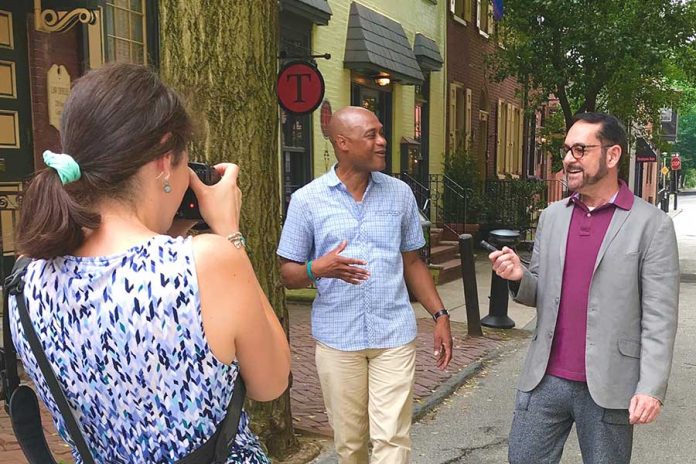This year, Philadelphia FIGHT Community Health Center is celebrating its 30th anniversary and the 10th anniversary of FIGHT Stories, a written collection of personal stories told by people who have utilized the organization’s services.
FIGHT Stories began at the organization’s 2010 gala, where FIGHT staffers assembled a book of client narratives which they decided to transform into a summer initiative. Now an annual project, stories are published in the fall and have been displayed at FIGHT’s past galas. Previous narratives are available on social media platforms and posters in FIGHT’s offices.
“The FIGHT Stories project is really at the heart and soul of all we do at Philadelphia FIGHT,” said Chip Alfred, director of development and communications for the organization. “Every good story has heart … every good story has struggles, and every good story hopefully has triumph, and has hope and has joy. That’s what you find in this project.”
Marcus Hill, a Black gay man, diagnosed with HIV as a teenager, is one of this year’s storytellers. He came to FIGHT for services, which operated primarily as an AIDS Service Organization at the time. Hill was one of the first to graduate from Project TEACH (Treatment Education Activists Combating HIV), a program that trains people with HIV/AIDS to serve as educators and activists in underserved areas.
“When I talk with people who have it, they know they’re not alone,” Hill said. “They know they have a chance. They know they have support. They know that there’s treatment. They can find a friend. This is not a disease about sexuality or race; it’s about the human condition.”
Roughly 19,147 people in Philadelphia are living with HIV, according to AIDSvu, a data visualization tool that maps the HIV epidemic U.S. communities. According to the Philadelphia Department of Public Health, in 2018, 76.2 percent of those newly diagnosed with HIV were assigned male at birth, and 23.8 percent were assigned female at birth. Fifty-eight percent of people newly diagnosed were Black, 20 percent were Hispanic and 18.3 percent were white.
Julie Dillon’s story is also part of this year’s Stories project. Dillon, a trans woman of color, sought medical treatment and housing from FIGHT three years ago. Since then, she participated in Project TEACH and is now a peer educator.
“There’s been a few people who have walked up to me saying that they saw my story online, and they felt empowered just reading it,” Dillon said. “I overcame a lot by myself in an unknown land, with just the resources available in the city. Because of that, I feel like I am a good candidate to help other people with their struggles in Philadelphia because I did it, and I’m not even from here.”
Dillon felt mostly positive about retelling her experiences living with HIV, seeking help from FIGHT and beginning her transition, despite struggling to recount a time in her life when she wasn’t living as her authentic gender.
“As I was going down the different times of my life, I realized how I overcame those challenges, grew from it and continue to thrive,” she said.
Medical interns also help make the stories project possible as part of FIGHT’s summer program, Bridging the Gaps. Emily Webster and Megan Zimbelman worked as part of last year’s program and helped write Dillon’s story, among others.
“The most meaningful aspect of these stories was hearing the daily challenges and struggles these individuals faced and how FIGHT assisted them in overcoming these barriers,” Webster said in an email. “I was able to learn how FIGHT acts as a beacon of hope for a better future during the dark times in these peoples’ lives.”
Thirty years after its beginning as an ASO, FIGHT has grown substantially. In addition to four health centers, FIGHT operates a dental clinic, a behavioral health center and a re-entry program called Institute for Community Justice. The organization also offers educational resources, like Project TEACH, job training and more.
After FIGHT became a federally qualified health center in 2013, its patient population tripled, Alfred said. FIGHT currently has over 8,000 patients with 200 staff members.
“We’re evolving,” Alfred said. “What FIGHT was, even eight or 10 years ago, is not what FIGHT is now. Many people knew us as an AIDS Service Organization. For a long time we were, and we never want to forget our roots. The HIV epidemic is not over.”
Until 2015, FIGHT’s annual gala was called “FIGHT for Life.” But because fewer people are dying from HIV due to advancements in medical treatment, FIGHT staffers decided that the organization no longer needs to fight for its patients’ lives.
But Alfred pointed out that other fights are still necessary. As such, “Honoring our FIGHT” is the theme of the organization’s 30th Anniversary Gala, which will take place this December at the Crystal Tea Room.
“The 30th anniversary is about honoring our past, honoring our legacy,” Alfred said. “For the Crystal Tea Room, looking into our crystal ball, into the future with hope and optimism as to what’s next.”
